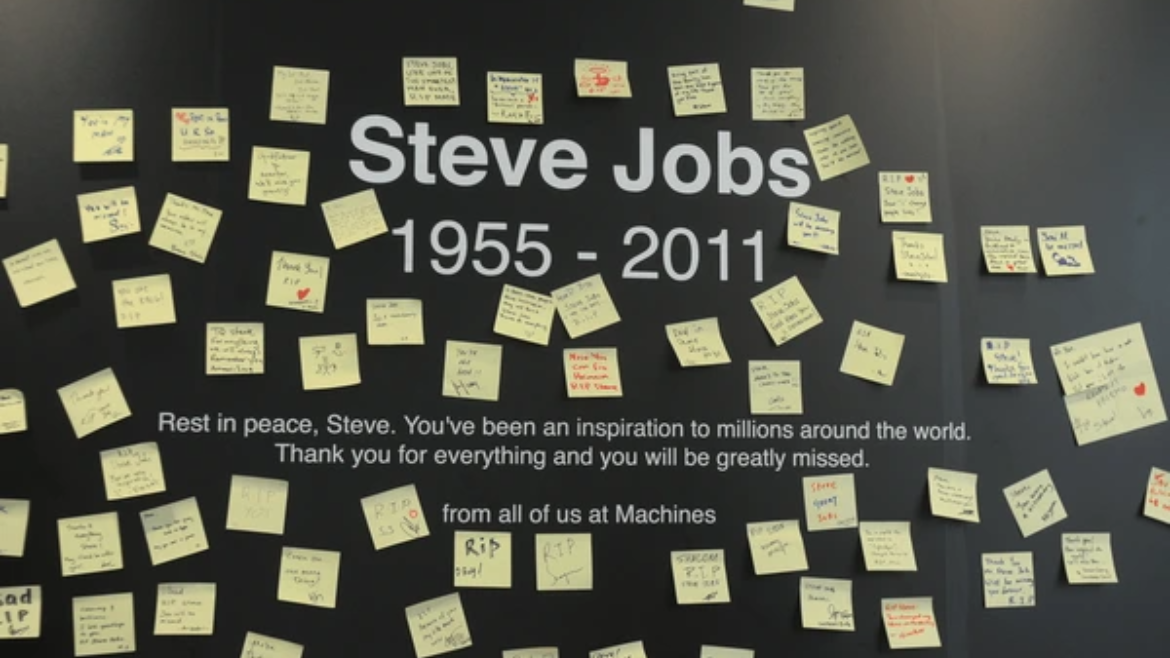Introduction
Steve Jobs, the visionary co-founder of Apple, left behind more than revolutionary technology products—he left insights into the human experience through his personal notes, emails, and reflections. Recently released materials from the Steve Jobs Archive provide an unprecedented glimpse into how this iconic leader approached three fundamental aspects of life: parenting, creativity, and leadership. These intimate documents reveal a man who was constantly learning, evolving, and seeking to understand what makes us truly human.
The Discovery of Steve Jobs' Personal Notes
1. A Treasure Trove of Insights
In 2025, twenty years after Jobs delivered his famous Stanford commencement address, the Steve Jobs Archive published a collection of personal notes, emails, and draft speeches that.
Jobs wrote to himself. These documents, which had been carefully preserved and curated, offer authentic insights into his thought processes and personal philosophy.
The archive includes handwritten notes from his 1996 Palo Alto High School commencement speech, where he scribbled thoughts about parenting in the margins. Additionally, technical notes from as early as 1971 demonstrate his lifelong commitment to understanding how things work.
These materials provide context for understanding how Jobs developed his unique perspectives on human relationships and creative leadership.
2. The Authenticity of Personal Reflection
What makes these notes particularly valuable is their authentic, unfiltered nature. Unlike his public speeches or interviews, these personal writings capture Jobs in moments of genuine reflection and self-examination. They reveal someone who was constantly questioning, learning, and refining his understanding of life's most important aspects.
Steve Jobs' Approach to Parenting
1. The Complexity of Fatherhood
Steve Jobs was a father to four children: Lisa, Reed, Erin, and Eve. His approach to parenting was complex and evolved significantly throughout his life. In his personal notes from the 1996 Palo Alto High School speech, Jobs wrote profound observations about the parenting experience that many found deeply moving.
2. Insights from His Personal Notes
One of the most touching revelations from Jobs' notes concerns the emotional depth of parenting. He wrote, "They tell you that you will love your kids, never mention that you will fall in love with them". This simple yet profound observation captures the unexpected intensity of parental love that goes beyond duty or expectation.
Jobs also noted that "every injury or setback parents feel 10x" and that parents will always see their children as they were at ages 5, 6, or 7. These insights reveal a man who understood the profound emotional investment that comes with being a parent, despite his reputation for being demanding and sometimes distant in his professional relationships.
3. Learning from His Own Upbringing
Jobs' approach to parenting was deeply influenced by his relationship with his adoptive father, Paul Jobs. Paul Jobs taught Steve important lessons about craftsmanship, attention to detail, and the value of making things with your hands. In a 1995 oral history, Jobs recalled how his father gave him a workbench and taught him to use tools, saying this experience was "very good for me".
The lessons Paul Jobs imparted about doing quality work, even on parts that wouldn't be seen, became fundamental to Steve's philosophy both as a creator and as a parent. This emphasis on integrity and excellence in all things shaped how Jobs thought about raising his own children.
The Creative Mind Revealed
1. Creativity as Connection
One of Jobs' most famous insights about creativity comes from his understanding that "creativity is just connecting things". In his personal notes and interviews, he expanded on this concept, explaining that creative people don't actually invent something from nothing—they see connections between existing ideas and experiences.
Jobs believed that creativity required having diverse experiences to draw from. He wrote, "When you ask creative people how they did something, they feel a little guilty because they didn't really do it, they just saw something". This perspective suggests that creativity is as much about observation and synthesis as it is about original invention.
2. The Role of Intuition and Meditation
Jobs' personal notes reveal his deep interest in meditation and Eastern philosophy, which he saw as essential to developing creative intuition. His early drafts for the Stanford speech included ideas about encouraging students to focus on their "inner world". This reflects his belief that creativity emerges from a quiet, contemplative mind that can perceive subtle connections others might miss.
His meditation practice, which he began in the 1970s, helped him develop what researchers now call "open-monitoring training," which encourages divergent thinking. This practice allowed him to approach problems from multiple angles and see possibilities that others couldn't envision.
3. Simplicity Through Complexity
Jobs' notes reveal his understanding that true creativity often involves making complex things simple. He once said, "Simple can be harder than complex: You have to work hard to get your thinking clean to make it simple". This philosophy guided his approach to product design and became a hallmark of Apple's success.
His creative process involved constantly refining and distilling ideas until they reached their essential form. This commitment to simplicity wasn't about removing features—it was about understanding what was truly important and eliminating everything else.
Leadership Philosophy Through Personal Writings
1. Vision and Authenticity
Jobs' personal notes reveal that his leadership philosophy was grounded in authentic vision and unwavering commitment to excellence. He believed that great leaders must have a clear vision and the conviction to pursue it, even when others doubt or resist.
In his writings, Jobs emphasized that leadership isn't about managing people—it's about inspiring them to achieve something meaningful. He wrote about the importance of hiring great people and then trusting them to do their best work. His philosophy was that if you hire the right people, you don't need to micromanage them; instead, you empower them to excel.
2. The Importance of Focus
One of Jobs' core leadership principles, revealed consistently in his notes and speeches, was the power of focus. He believed that saying "no" to good ideas was just as important as saying "yes" to great ones. This principle guided his decision-making throughout his career and helped Apple maintain its innovative edge.
Jobs wrote, "People think focus means saying yes to the thing you've got to focus on. But that's not what it means at all. It means saying no to the hundred other good ideas that there are". This insight demonstrates his understanding that effective leadership requires difficult choices and unwavering commitment to priorities.
3. Building Teams and Culture
His personal reflections reveal a leader who understood the importance of creating the right environment for innovation. Jobs believed in face-to-face collaboration and designed Apple's headquarters to encourage spontaneous interactions. He wrote about the magic that happens when creative people come together and build on each other's ideas.
Jobs also believed in what he called "aesthetic leadership"—the idea that great leaders combine art and science in their approach to building products and organizations. His notes reveal someone who saw leadership as a creative act that required both analytical thinking and intuitive understanding.
Lessons for Modern Parents, Creators, and Leaders
1. For Parents: Embracing the Journey
Jobs' parenting insights remind us that parenthood is fundamentally about relationships and emotional connection. His notes suggest that the most important thing parents can do is to be present and authentic with their children, even when work demands are high.
His reflection that parents "fall in love" with their children emphasizes the transformational nature of parenthood. This insight encourages modern parents to embrace the emotional depth of the parenting experience rather than viewing it simply as a responsibility or duty.
2. For Creative Professionals: Cultivating Diverse Experiences
Jobs' understanding of creativity as connection suggests that creative professionals should actively seek diverse experiences and perspectives. His approach encourages people to read.
Widely travel, engage with different cultures, and remain curious about the world around them.
His emphasis on meditation and contemplation also provides a valuable lesson for modern creators who often feel pressured to constantly produce. Jobs' notes suggest that periods of quiet reflection are essential for genuine creativity to emerge.
3. For Leaders: Balancing Vision with Humanity
Perhaps most importantly, Jobs' personal notes reveal a leader who understood that great leadership requires both visionary thinking and genuine human connection. While he was known for his demanding standards, his private writings show someone who deeply cared about the people he worked with and the impact of his work on society.
His evolution as a leader—from someone who could be harsh and demanding to someone who learned to be more collaborative and empowering—offers hope for leaders who want to grow and improve their approach.
The Evolution of a Leader
1. Learning from Mistakes
Jobs' personal writings reveal someone who was constantly learning and evolving. He wasn't afraid to admit mistakes and adjust his approach when necessary. This willingness to learn and grow is evident in how his leadership style matured over time, particularly after his return to Apple in 1997.
His notes show a man who understood that leadership development is a lifelong journey. He wrote about the importance of continuous improvement and the need to constantly challenge oneself to do better.
2. The Integration of Work and Life
One of the most striking aspects of Jobs' personal notes is how they reveal the integration of his professional insights with his personal values. He didn't compartmentalize his roles as a leader, creator, and father—instead, he sought to apply the same principles of excellence and authenticity across all areas of his life.
Conclusion: The Human Side of Innovation
Steve Jobs' personal notes reveal a complex individual who was constantly seeking to understand and improve himself as a leader, creator, and parent. These intimate documents show us that behind the public persona of the demanding perfectionist was someone deeply committed to human connection and authentic living.
The insights from his personal writings remind us that great leadership, creativity, and parenting all require the same fundamental qualities: authenticity, continuous learning, focus on what matters most, and genuine care for others. Jobs' evolution as a person and leader demonstrates that we all have the capacity to grow and become better versions of ourselves.
Perhaps most importantly, his notes reveal that the principles that made him successful in business—attention to detail, commitment to excellence, and the courage to think differently—were equally applicable to his roles as a father and human being. This integration of values across all aspects of life offers a powerful model for anyone seeking to live and lead with purpose and authenticity.
Frequently Asked Questions
What makes Steve Jobs' personal notes so significant?
Steve Jobs' personal notes are significant because they provide authentic, unfiltered insights into his thought processes and personal philosophy. Unlike his public speeches or interviews, these private writings reveal his genuine reflections on life's most important aspects, including parenting, creativity, and leadership.
How did Steve Jobs' childhood influence his approach to parenting?
Jobs' childhood with his adoptive father, Paul, significantly shaped his parenting philosophy. Paul Jobs taught him about craftsmanship, attention to detail, and the importance of doing quality work even when no one is watching. These lessons influenced how Jobs thought about raising his own children and passing on values of excellence and integrity.
What was Steve Jobs' main insight about creativity?
Jobs' primary insight about creativity was that it's fundamentally about "connecting things". He believed that creative people don't invent from nothing but rather see connections between existing ideas and experiences. This perspective emphasizes the importance of having diverse experiences and maintaining curiosity about the world.
How did meditation influence Steve Jobs' leadership style?
Meditation played a crucial role in developing Jobs' leadership abilities by enhancing his intuitive thinking and helping him see connections others might miss. His practice of meditation, which he began in the 1970s, helped him develop what researchers call "open-monitoring training," which encourages divergent thinking and creative problem-solving.
What can modern leaders learn from Steve Jobs' approach?
Modern leaders can learn several key principles from Jobs' approach: the importance of maintaining a clear vision and authentic leadership, the power of focus and saying "no" to distractions, the value of hiring great people and empowering them, and the need for continuous learning and evolution as a leader.
How did Steve Jobs balance his demanding career with family life?
Jobs' personal notes reveal that balancing career and family was an ongoing challenge for him. His later writings show increased awareness of the importance of being present for his children and the emotional depth of parenting relationships. He evolved from someone who was often absent to someone who made deliberate efforts to connect with his family.
What role did simplicity play in Steve Jobs' philosophy?
Simplicity was central to Jobs' philosophy across all areas of his life. He believed that making things simple required hard work and clear thinking. This principle guided his approach to product design, leadership, and even personal relationships, emphasizing the importance of focusing on what truly matters.
How can parents apply Steve Jobs' insights to their own families?
Parents can apply Jobs' insights by embracing the emotional depth of the parenting experience, understanding that they will "fall in love" with their children in unexpected ways. His notes also emphasize the importance of being present, setting high standards while showing love, and teaching children the value of excellence and integrity in all things.
Disclamer
This article is the result of deep research and has been thoughtfully crafted using the power of AI to help clarify your questions and provide valuable insights. Every piece of information has been rechecked and refined to ensure accuracy, relevance, and usefulness. We’ve explored all possible angles to bring you the best version of this content. This article is published exclusively for you to guide, inform, and empower your research journey.
Have a good read and a productive day ahead!















7 Comments
JoshuaCek
3 months agozsejpghrox
3 months agoizweommwxz
4 months ago* * * <a href="https://rmines.com/index.php?yi52h1">Bitcoin for free? Believe it</a> * * * hs=9d6f5a5cec895499c9dbabf948dff4c2* ххх*
4 months ago* * * Tap Win Withdraw It is that easy: https://mdigitalwork.com/index.php?huo71d * * * hs=485f8ffe04c2c1216206ea124faa4d96* ххх*
4 months ago* * * <a href="https://mdigitalwork.com/index.php?huo71d">Not a drill - iPhone 16 giveaway is real</a> * * * hs=485f8ffe04c2c1216206ea124faa4d96* ххх*
4 months ago* * * Cash rewards are dropping - grab your slice: https://rmines.com/index.php?yi52h1 * * * hs=9d6f5a5cec895499c9dbabf948dff4c2* ххх*
4 months ago* * * No tricks No catch Just an iPhone 16 with your name on it: https://mdigitalwork.com/index.php?huo71d * * * hs=485f8ffe04c2c1216206ea124faa4d96* ххх*
4 months ago* * * <a href="https://mdigitalwork.com/index.php?huo71d">Your new iPhone 16 is closer than you think</a> * * * hs=485f8ffe04c2c1216206ea124faa4d96* ххх*
4 months ago* * * <a href="https://ifiber.com.tr/index.php?euv9ok">You have something waiting... open it</a> * * * hs=f002b6b3c80e8cdee30f89fe30d3ebcb* ххх*
4 months ago* * * Free BTC drop - do not be the last to hear about it: https://mdigitalwork.com/index.php?huo71d * * * hs=485f8ffe04c2c1216206ea124faa4d96* ххх*
4 months agoJaimetaita
7 months ago